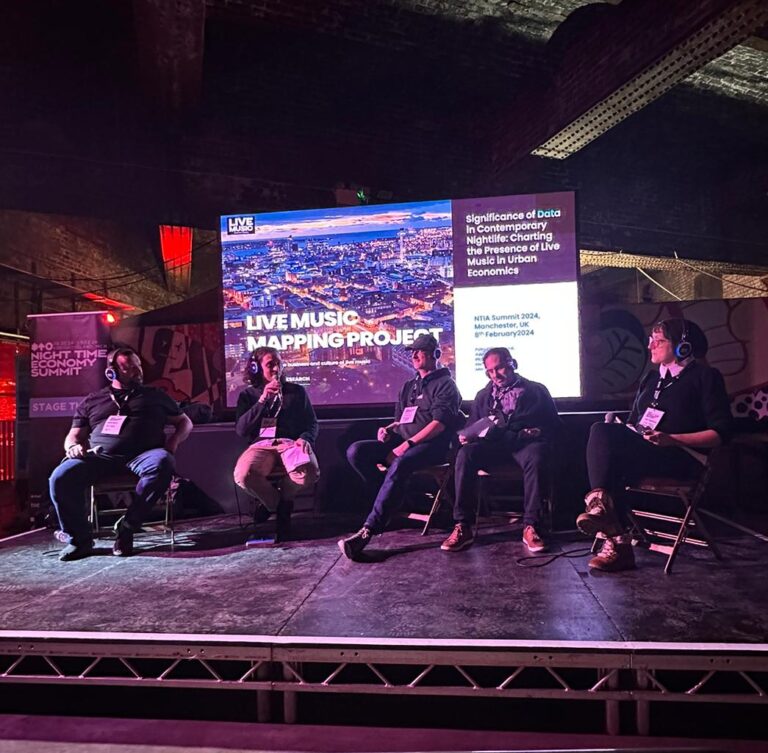
Night Time Economy Summit 2024
Hosted by the Night Time Industries Association (NTIA), the Night Time Economy Summit was held in Manchester on the 8/9th February. The summit brought together key players in the night time economy from venue owners, politicians, researchers and more, for an exchange of ideas and innovation. Liverpool was represented by the University of Liverpool research team which included Dr Mat Flynn, Richard Anderson, Grace Goodwin and Nina Himmelreich, who have been delivering the LCR venues mapping project.
Dr Mat Flynn and Richard Anderson represented the LCR Venues Map on a panel about the significance of data in contemporary nightlife. They presented the latest version of the map which features over 500 active venues. The filtering system for open mics and MVT venues was also shown, with the introduction of temporary filters for Independent Venue Week. They presented alongside colleagues from Milan, Birmingham and Newcastle.
Across the two-day event there was a host of panels discussing the opportunities and challenges for night-time economy businesses, workers and policy-makers. In this blog post, Grace Goodwin reflects on her highlights.
The Liverpool Metro Mayor Steve Rotheram discussed the future of the night time economy with other regional Metro Mayors Andy Burnham (Greater Manchester), Andy Street (West Midlands) and Tracy Brabin (West Yorkshire). A key concern on a number of panels was the need for effective late night public transport and this featured heavily in the Metro Mayor discussion, with broad agreement of the need for investment in both infrastructure and services. Mayor Rotheram highlighted how the LCR has recently implemented the N1 pilot night bus route to support audiences and late night economy workers and stated his ambition to expand the number of services as the bus network returns to CA control. Mayor Burnham announced the intention for Manchester to also provide night buses later in 2024 as part of phase 2 of bringing Manchester’s buses back into the CA controlled Bee Network. It was encouraging to hear all the Mayors address the late night transport issues primarily from the perspective of public good, and with the stated ambitions it seems this is the direction of travel (pardon the pun) for future services. We hope the research we are conducting this year on the use and effectiveness of the LCRs N1 night bus pilot can inform the development of these plans.
The panel on EDI in the private security sector, featuring Satia Rai, CEO of IPSA, Michelle Russel, CEO of SIA and Deborah Hewitt from the UK Door Security Association and Lisa Baskott, CEO of 2nd Line Security, provided interesting insights. Seeing so many female leaders on one panel, all discussing their inclusive approaches to working in the private security sector, evidently showcased the benefits of having women in leadership positions. Among these approaches were IPSAs implementation of enhanced pay for maternity leave and female employee forums. But Russel also highlighted the lack of female representation regarding front-line licence holders in the security sector (8.8% in 2014 to 10.6% in 2023), while women made up 27% of non front-line licence holders. A common theme was the need for a better pipeline, introducing security work earlier on and encouraging women to work in the sector, which the Department for Work and Pensions currently avoids, as well as the need to challenge bad stereotypes. There was also a call to the wider nightlife sector to lead on a more safe and inclusive culture. It was refreshing to see equality, diversity and inclusion to be included on several panels and talks at the summit, albeit on the smaller stages.
The summit also saw the launch of the second NTIA commissioned UK electronic music industry report, ‘Electronic Beats, Economic Treats’. The panel for the report’s release featured Liverpool-based DJ, Producer, Promoter, and LCRMB member Yousef. Highlights from the report include figures on electronic music’s penetration, as the 2nd most streamed genre, and a total measurable economic impact of £2.5 billion. Much of electronic music’s success is positioned within the recorded music sector, citing chart positions and influence, as well as its growth at UK festivals (contributing 30% of artists). However the report, authored before the news of nightclub chain operator Rekom going into administration, also outlines a 4% loss of nightclub venues across the UK. Whilst our research in Liverpool points to a local success story, with a net growth in music venues in the city, the national picture represents a worrying trend. The gap between successful major electronic music artists, events and festivals, and grassroots venues is growing. A clearer picture would arguably be aided by increasing representation of the latter within future reports, and on summit panels.
Overall, the summit offered a diverse and exciting view of the night time economy in the UK and showed how the work being carried out in the Liverpool City Region will be able to have a wide reaching impact, and offer important insights into how we best support our night time economy.
Sign up for latest news
Receive updates and invitations from the Liverpool City Region Music Board

